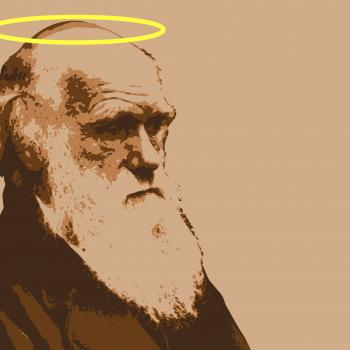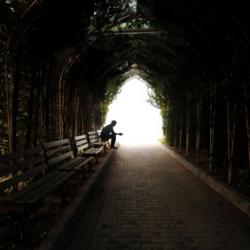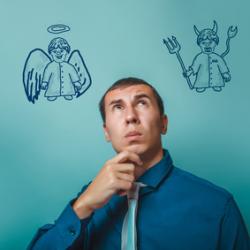Connor Wood

In most religious congregations, consuming illegal drugs during the service would result in a less than enthusiastic response from the ecclesiastical leadership. Indeed, survey after survey has shown that religiosity and drug use are reliably negatively correlated – the more religious you are, the less likely you are to do drugs of any kind. But the story may not be so simple. Researchers in Eastern Europe are finding a potential counter-phenomenon: consumers of certain drugs, particularly marijuana and psychedelics, may be more inclined to mystical and spiritual experiences.

It’s an almost laughable stereotype: the druggie college roommate whose bookshelf is filled with tomes on Daoism, Buddhism, and other forms of “alternative” spirituality. Combine that image with the cultural legacy of the 1960s, when renegade researchers such as Timothy Leary reported on their drug experiences in terms of spiritual awakening, and it’s hard to shake the association of drugs such as marijuana, psilocybin (the ingredient in “magic mushrooms”), and LSD with individualistic, even non-religious spirituality. But is there actually anything to that assumption?
Two papers published recently in the Journal of Psychoactive Drugs suggest that the answer may, indeed, be yes. The first, by Radmila Lorencova (University of Pardubice, Czech Republic), suggests that marijuana users are more spiritual than alcohol users. The second, by Levente Móró (University of Turku, Finland), Katalin Simon (Semmelweis University, Hungary), Imre Bárd (London School of Economics), and József Rácz (Semmelweis University), argues that people who use psychedelic drugs for the purpose of self-discovery are more spiritual and have better coping skills than non-users or those who use for entertainment or escape.
Lorencova used the Prague Spirituality Questionnaire, a Czech-language measure of personal spirituality, to assess the spiritual experiences of more than 150 young Czech respondents. Since nearly all the respondents drank alcohol, Lorencova divided the respondents into two groups: those who consumed only alcohol and those who consumed both alcohol and marijuana. After the results were analyzed, Lorencova found that marijuana users scored significantly higher on the “mysticism” subdimension of the questionnaire, particularly two specific items (“I have had the feeling that the secrets of the universe and of existence are opening before me” and “I have experienced the feeling that my “self” immerses in a reality which is greater than my “self” is”).
Perhaps more interestingly, Lorencova also distinguished two other groups in the sample: those whose spiritual experience arose from drug use and those whose spiritual experiences were encountered while sober. In four of the six dimensions of the questionnaire – mysticism, togetherness, moral involvement, and transcendental-monotheistic experience – individuals whose spiritual experiences were the the result of drug use were rated as more spiritual than their peers. In other words, both drug users and non-drug users had spiritual experiences. But the drug users had more of them (or else those experiences were somehow more intense or life-changing).
Móró and colleagues, meanwhile, worked with a Hungarian population to investigate the links between psychedelic drug use and spirituality. The authors defined “psychedelics” as only those drugs in a specific, hallucinatory class, such as LSD, psilocybin, and mescaline. Marijuana and other drugs, including heroin, stimulants, and alcohol, were classified differently.
The respondents were separated into three groups according to their use of these psychedelic drugs. Using a special formula, the authors identified psychedelic drug users whose experiences were motivated by the desire for self-discovery and separated them from users who were simply out for a good time or were looking to escape. A third group had never had any psychedelic experiences. All three groups were measured for psychological coping skills, a sense of purpose in life, and intrinsic spirituality (a measure of spirituality separate from identification with an institutional religion).
Unsurprisingly, those respondents whose drug use patterns were identified as problematic demonstrated lower levels of coping and feeling a purpose in life. Perhaps more unexpectedly, however, respondents who had used psychedelic drugs for the purpose of self-discovery showed higher-than-average coping skills – and higher levels of intrinsic spirituality. Related analyses also showed that the more different psychedelic drugs a person had used, the more likely that person was to rate as highly spiritual.
Meanwhile, while psychedelic drugs didn’t appear to lead to a greater feeling of life purpose, taking other kinds of drugs actually seemed to hurt respondents’ sense of purpose. The amount of non-psychedelic drugs a person had taken was inversely correlated with feeling a purpose in life, as was the number of drugs in total.
Móró and colleagues interpreted these findings to suggest that psychedelic drugs, when taken with the explicit motivation of enhancing self-discovery and self-knowledge, may not harm their users as much as other drugs or psychedelics that are taken with the aim of escaping or merely being entertained. And according to certain measures, psychedelics taken for the purpose of self-discovery may even lead to greater levels of spirituality and better psychological coping resources.
Of course, the editors of ScienceOnReligion.org don’t encourage drug use or experimentation with wild and woolly psychedelics. But a growing body of research suggests that certain psychoactive substances may generate unique – and sometimes religiously or spiritually oriented – experiences if used in the proper context.
And really, it’s no surprise – the use of “entheogens,” or spiritual experience-producing substances, is relatively widespread in the world’s spiritual traditions, particularly those of small-scale and hunter-gatherer societies. Countless Western writers, from William James to Aldous Huxley, have pointed out the similarities between religious experiences as reported by great mystics and certain drug-based experiences. Regardless of what actually happens when psychoactive substances act on people’s nervous systems, the experiences that result are often reported as feeling spiritual or mystical. Untangling the complicated relationship between spiritual experience and psychoactive substance use will be a project to keep researchers occupied for a long, long time, particularly given the touchy cultural and moral associations such substances bring with them. The fact is, drugs harm a lot more people in our culture than they help. Maybe a little nuanced understanding could help us start to learn why, and how things might be different.











